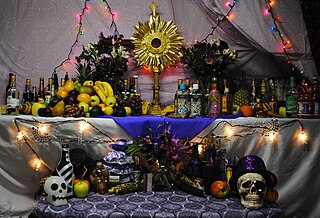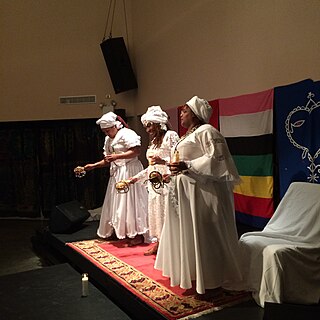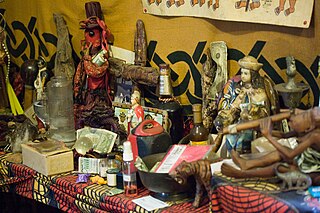
A priest is a religious leader authorized to perform the sacred rituals of a religion, especially as a mediatory agent between humans and one or more deities. They also have the authority or power to administer religious rites; in particular, rites of sacrifice to, and propitiation of, a deity or deities. Their office or position is the 'priesthood', a term which also may apply to such persons collectively. A priest may have the duty to hear confessions periodically, give marriage counseling, provide prenuptial counseling, give spiritual direction, teach catechism, or visit those confined indoors, such as the sick in hospitals and nursing homes.
Ọrunmila is the Orisha of Wisdom, knowledge, and Divination, is the creator of Ifá and Babalawo concept. He is a high priest of Ifa.

Umbanda is a religion that emerged in Rio de Janeiro, Brazil in the 1920s. Deriving largely from Spiritism, it also combines elements from Afro-Brazilian traditions like Candomblé as well as Roman Catholicism. There is no central authority in control of Umbanda, which is organized around autonomous places of worship termed centros or terreiros, and is broadly divided between White Umbanda, which is closer to Spiritism, and Africanized Umbanda, which is closer to Candomblé.

Candomblé is an African diasporic religion that developed in Brazil during the 19th century. It arose through a process of syncretism between several of the traditional religions of West Africa, especially those of the Yoruba, Bantu, and Gbe. There is some influence from the Roman Catholic form of Christianity. There is no central authority in control of Candomblé, which is organized around autonomous terreiros (houses).

Hieros gamos, hieros (ἱερός) meaning "holy" or "sacred" and gamos (γάμος) meaning "marriage," or Hierogamy, is a sacred marriage that plays out between gods, especially when enacted in a symbolic ritual where human participants represent the deities.
Obeah, or Obayi, is a series of African diasporic spell-casting and healing traditions found in the former British colonies of the Caribbean. These traditions derive much from traditional West African practices that have undergone cultural creolization. There is much regional variation in the practice of Obeah, which is followed by practitioners called Obeahmen and Obeahwomen.

Homosexuality in Haitian Vodou is religiously acceptable and homosexuals are allowed to participate in all religious activities. However, in West African countries with major conservative Christian and Islamic views on LGBTQ people, the attitudes towards them may be less tolerant if not openly hostile and these influences are reflected in African diaspora religions following Atlantic slave trade which includes Haitian Vodou.

A manbo is a priestess in the Haitian Vodou religion. Haitian Vodou's conceptions of priesthood stem from the religious traditions of enslaved people from Dahomey, in what is today Benin. For instance, the term manbo derives from the Fon word nanbo. Like their West African counterparts, Haitian manbos are female leaders in Vodou temples who perform healing work and guide others during complex rituals. This form of female leadership is prevalent in urban centers such as Port-au-Prince. Typically, there is no hierarchy among manbos and oungans. These priestesses and priests serve as the heads of autonomous religious groups and exert their authority over the devotees or spiritual servants in their hounfo (temples).

Haitian Vodou is an African diasporic religion that developed in Haiti between the 16th and 19th centuries. It arose through a process of syncretism between several traditional religions of West and Central Africa and Roman Catholicism. There is no central authority in control of the religion and much diversity exists among practitioners, who are known as Vodouists, Vodouisants, or Serviteurs.

A mãe-de-santo (Portuguese pronunciation:[ˈmɐ̃jdʒiˈsɐ̃tu], or ialorixá, is a priestess of Umbanda, Candomblé and Quimbanda, the Afro-Brazilian religions. In Portuguese those words translate as "mother of [the] saint[s]", which is an adaption of the Yoruba language word iyalorishá, a title given to priest women in African religions. Iyá means mother, and the contraction l'Orishá means "of Orishá". As a product of the syncretism, the word Orishá was adapted into Portuguese as saint.

Louisiana Voodoo, also known as New Orleans Voodoo, is an African diasporic religion that originated in Louisiana, now in the southern United States. It arose through a process of syncretism between the traditional religions of West Africa, the Roman Catholic form of Christianity, and Haitian Vodou. No central authority is in control of Louisiana Voodoo, which is organized through autonomous groups.

Christian-Vodou relations describe the relationship between Christianity and certain African diaspora religions, including Haitian Vodou and Louisiana Voodoo, and have been marked by syncretism and conflicts, especially in Haiti, but less so in Louisiana and elsewhere.

Santería, also known as Regla de Ocha, Regla Lucumí, or Lucumí, is an African diasporic religion that developed in Cuba during the late 19th century. It arose through a process of syncretism between the traditional Yoruba religion of West Africa, the Catholic form of Christianity, and Spiritism. There is no central authority in control of Santería and much diversity exists among practitioners, who are known as creyentes ("believers").
Max Gesner Beauvoir was a Haitian biochemist and houngan. Beauvoir held one of the highest titles of Voudou priesthood, Ati or "Supreme Serviteur", a title given to Houngans and Mambos who have a great and very deep knowledge of the religion, and status within the religion. As Supreme Serviteur, Max was seen as a high authority within Vodou.

The Saltigue, are Serer high priests and priestesses who preside over the religious ceremonies and affairs of the Serer people, such as the Xooy ceremony, the biggest event in the Serer religious calendar. They usually come from ancient Serer paternal families. Such a title is usually inherited by birthright. In Serer country, Saltigue are always diviners. The scope of this article deals only with the Serer Saltigues – "diviners" and termed by some scholars as "the ministers of the religious cult"; "pastors of the people" or within the remits of these definitions.
Hausa animism, Maguzanci or Bori is a pre-Islamic traditional religion of the Hausa people of West Africa that involves magic and spirit possession. While only a part of the Hausa people converted to Islam before the end of the 18th century, most of the adherents of the religion did the same between the jihad started by the Islamic reformer Usman dan Fodio around 1800 and the middle of the 20th century, while a small minority converted to Christianity. Religious affiliation to this traditional religion is virtually nonexistent at the beginning of the 21st century; however, Hausa animism and Islam among Hausa people have coexisted for centuries, and some practices related to animism carry on locally.
Women occupy a unique role in the indigenous Japanese traditions of Shinto, including a unique form of participation as temple stewards and shamans, or miko. Though a ban on female Shinto priests was lifted during World War II, the number of women priests in Shinto is a small fraction of contemporary clergy.

Hiereiai was the title of the female priesthood or priestesses in ancient Greek religion, being the equivalent of the male title Hierei. Ancient Greece had a number of different offices in charge of worship of gods and goddesses, and both women and men functioned as priests. While there were local variations depending on cult, the Hiereiai had many similarities across ancient Greece. Normally, their office related only to a specific sanctuary or Greek temple.
Comfa is a folk religion in Guyana also known as Spiritualism or Faithism. The word "Comfa" is used by non-practitioners as a generic term for spirit possession in Guyana. However, the word "Comfa" is also a term to define the greater folk religion involving spirit possession originating in Guyana.
Priestess of Hathor or Prophetess of Hathor was the title of the Priestess of the goddess Hathor in the Temple of Dendera in Ancient Egypt.











